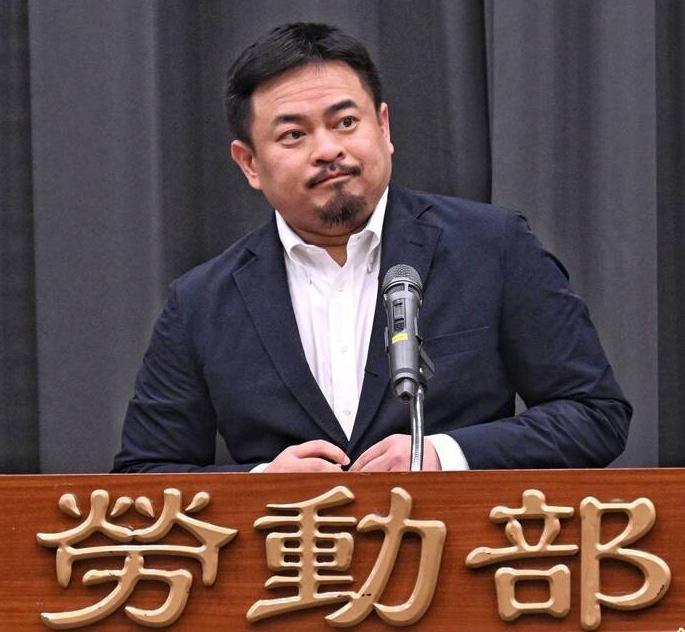Merely introducing migrant workers would not solve labor shortage issues, Minister of Labor Hung Sun-han (洪申翰) said, calling on industries to consider seniors and hiring young people part-time.
In an exclusive interview with the Central News Agency published today, Hung said that labor shortage issues need to be solved one step at a time.
The Ministry of Labor knows industries are calling for migrant workers, and is happy to conduct rolling reviews of the conditions of different industries, Hung said.

Photo: Fang Pin-chao, Taipei Times
There are two important prerequisites for introducing transnational labor, the minister said.
First, domestic workers’ employment opportunities and rights must be given first priority, he said.
Second, introducing transnational labor should not cause wages to remain stagnant or decline, he added.
In addition, it is important to protect migrant workers’ employment safety and labor rights, as they are statistically more likely to experience workplace accidents, Hung said.
According to Bureau of Labor Insurance data, from 2009 to 2018, the occupational accident rate for migrant workers in the manufacturing industry was almost twice that of domestic workers.
Many young people now prefer part-time or flexible work compared with full-time jobs, making it more challenging for businesses to find young people for full-time positions, Hung said.
This trend “shows that the younger generation values maintaining autonomy and flexibility in their lives,” he said.
Although the ministry does not encourage all businesses to offer part-time or flexible work, it “must do better” at helping companies adapt to this trend and protect labor rights, Hung said.
In particular, the ministry needs to ensure that employees have the necessary protections under the law, he said.
With Taiwan becoming a super-aged society, Hung also said he hopes companies can employ more middle-aged and elderly people, as these generations are becoming increasingly important to the nation’s labor market.

‘DENIAL DEFENSE’: The US would increase its military presence with uncrewed ships, and submarines, while boosting defense in the Indo-Pacific, a Pete Hegseth memo said The US is reorienting its military strategy to focus primarily on deterring a potential Chinese invasion of Taiwan, a memo signed by US Secretary of Defense Pete Hegseth showed. The memo also called on Taiwan to increase its defense spending. The document, known as the “Interim National Defense Strategic Guidance,” was distributed this month and detailed the national defense plans of US President Donald Trump’s administration, an article in the Washington Post said on Saturday. It outlines how the US can prepare for a potential war with China and defend itself from threats in the “near abroad,” including Greenland and the Panama

A wild live dugong was found in Taiwan for the first time in 88 years, after it was accidentally caught by a fisher’s net on Tuesday in Yilan County’s Fenniaolin (粉鳥林). This is the first sighting of the species in Taiwan since 1937, having already been considered “extinct” in the country and considered as “vulnerable” by the International Union for Conservation of Nature. A fisher surnamed Chen (陳) went to Fenniaolin to collect the fish in his netting, but instead caught a 3m long, 500kg dugong. The fisher released the animal back into the wild, not realizing it was an endangered species at

The High Prosecutors’ Office yesterday withdrew an appeal against the acquittal of a former bank manager 22 years after his death, marking Taiwan’s first instance of prosecutors rendering posthumous justice to a wrongfully convicted defendant. Chu Ching-en (諸慶恩) — formerly a manager at the Taipei branch of BNP Paribas — was in 1999 accused by Weng Mao-chung (翁茂鍾), then-president of Chia Her Industrial Co, of forging a request for a fixed deposit of US$10 million by I-Hwa Industrial Co, a subsidiary of Chia Her, which was used as collateral. Chu was ruled not guilty in the first trial, but was found guilty

DEADLOCK: As the commission is unable to forum a quorum to review license renewal applications, the channel operators are not at fault and can air past their license date The National Communications Commission (NCC) yesterday said that the Public Television Service (PTS) and 36 other television and radio broadcasters could continue airing, despite the commission’s inability to meet a quorum to review their license renewal applications. The licenses of PTS and the other channels are set to expire between this month and June. The National Communications Commission Organization Act (國家通訊傳播委員會組織法) stipulates that the commission must meet the mandated quorum of four to hold a valid meeting. The seven-member commission currently has only three commissioners. “We have informed the channel operators of the progress we have made in reviewing their license renewal applications, and